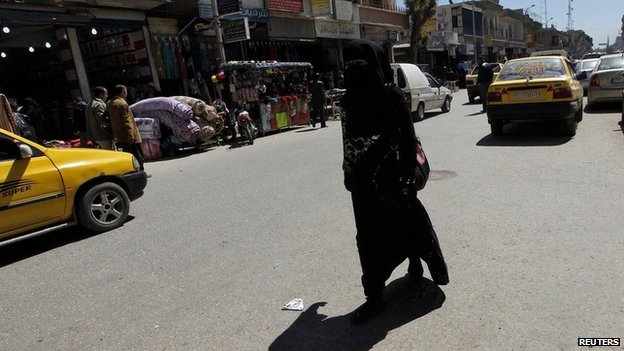Razan became accustomed to the new look imposed on women living in parts of northern Syria that were seized by Islamic State (IS) in 2013.
She used to wear modern headscarves with colourful outfits. But the jihadists forced her to wear a long, black abaya, a cloak covering her body, and a niqab, a veil that covered all but the area around her eyes.
But Razan was no ordinary woman. She was a doctor at a hospital and a civil society activist who campaigned against violence, especially violence against women.
During the first two years of the uprising in Syria - before IS first appeared and started to seize northern and eastern parts of the country - Razan and her fellow activists were able to operate freely and press their demands for freedom and democracy.
"It was a golden time", she says. "We had big dreams."
But soon, those dreams turned into nightmares. Razan's public activities had to become secret and she was unable to meet male activists because of strict gender segregation.
Stonings
It got even worse when female jihadists, many of them foreigners, started to arrive in IS-held areas and monitored the activities of women like Razan.
"We used to do a lot of stuff hiding under our niqab because male jihadists would not uncover us," Razan says. "But when the Khansaa Brigade for female jihadists was formed, we were even afraid inside our own homes."
Members of the Khansaa Brigade had the power to remove women's veils, carry out surprise searches of their homes, and monitor what they were doing.
Gatherings for anything other than religious purposes were prohibited and those who attended illegal meetings risked punishment by the Khansaa Brigade.
Islamic State's treatment of civilians became more brutal after the group announced the creation of a "caliphate" in the territory under its control in Syria and neighbouring Iraq in June.
"Their violence was beyond description; they terrified people," Razan recalls.
"Public whipping for men and women became a common practice. There were several cases of stoning of women who were accused of adultery by the group."
Even wearing the wrong type of niqab - if it was not light enough or was striped, for example - could lead to a woman being punished. In many cases, Sharia courts got involved.
Bodies on road
One hot summer's morning in 2014, Razan herself incurred the wrath of IS.
When members of the group visited her hospital, they began questioning her and criticised the way in which she was wearing her niqab. Razan covered her face completely to avoid any trouble.
After the men had left, one of them came back and warned her: "Run for your life. They are going to bring you before a Sharia court."
"I owe him my life," Razan says. "I still don't know why he helped me but he saved my life."
(BBC)
ANN.Az
Follow us !











